Commercial and Corporations Law: Issues of Contract Law and Remedies
VerifiedAdded on 2021/06/14
|10
|2958
|28
Homework Assignment
AI Summary
This assignment delves into several critical aspects of commercial and corporations law, focusing on a case involving an Indian classical dance performance. The first issue examines whether an oral assurance made by Kalpana constitutes a term of the contract, exploring the elements required for a valid contract and distinguishing between pre-contractual statements like mere puffs, representations, and terms. The second issue analyzes whether the oral assurance is considered a condition or a warranty, differentiating between these terms and their implications on remedies for breach of contract. The final issue discusses suitable remedies for USC against Kalpana in case of a breach, examining the availability of damages, liquidated damages, specific performance, and injunctions. The assignment applies legal principles to the provided scenario, offering conclusions for each issue. The solution is designed to help students understand contract formation, breach, and available remedies.
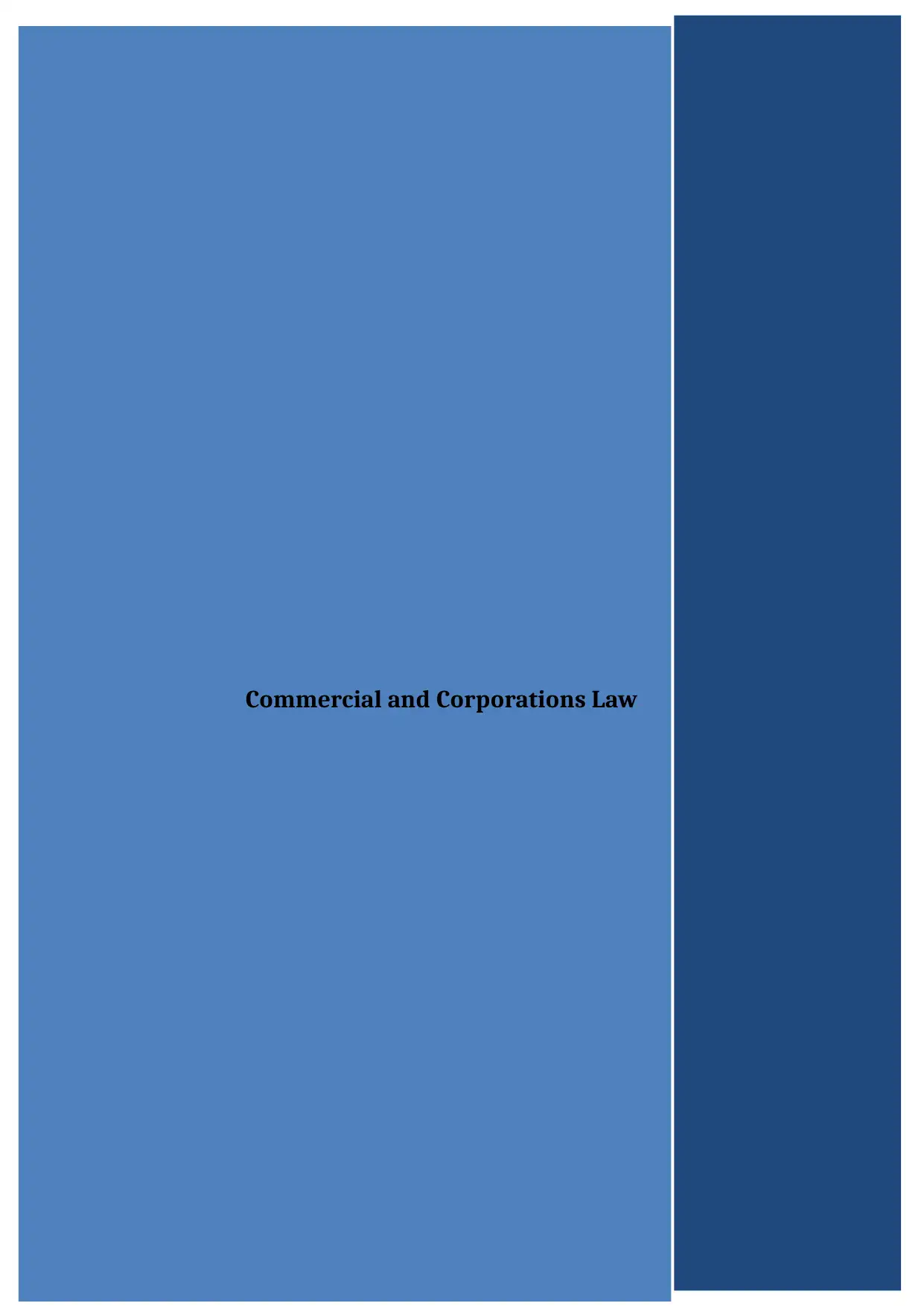
Commercial and Corporations Law
Paraphrase This Document
Need a fresh take? Get an instant paraphrase of this document with our AI Paraphraser
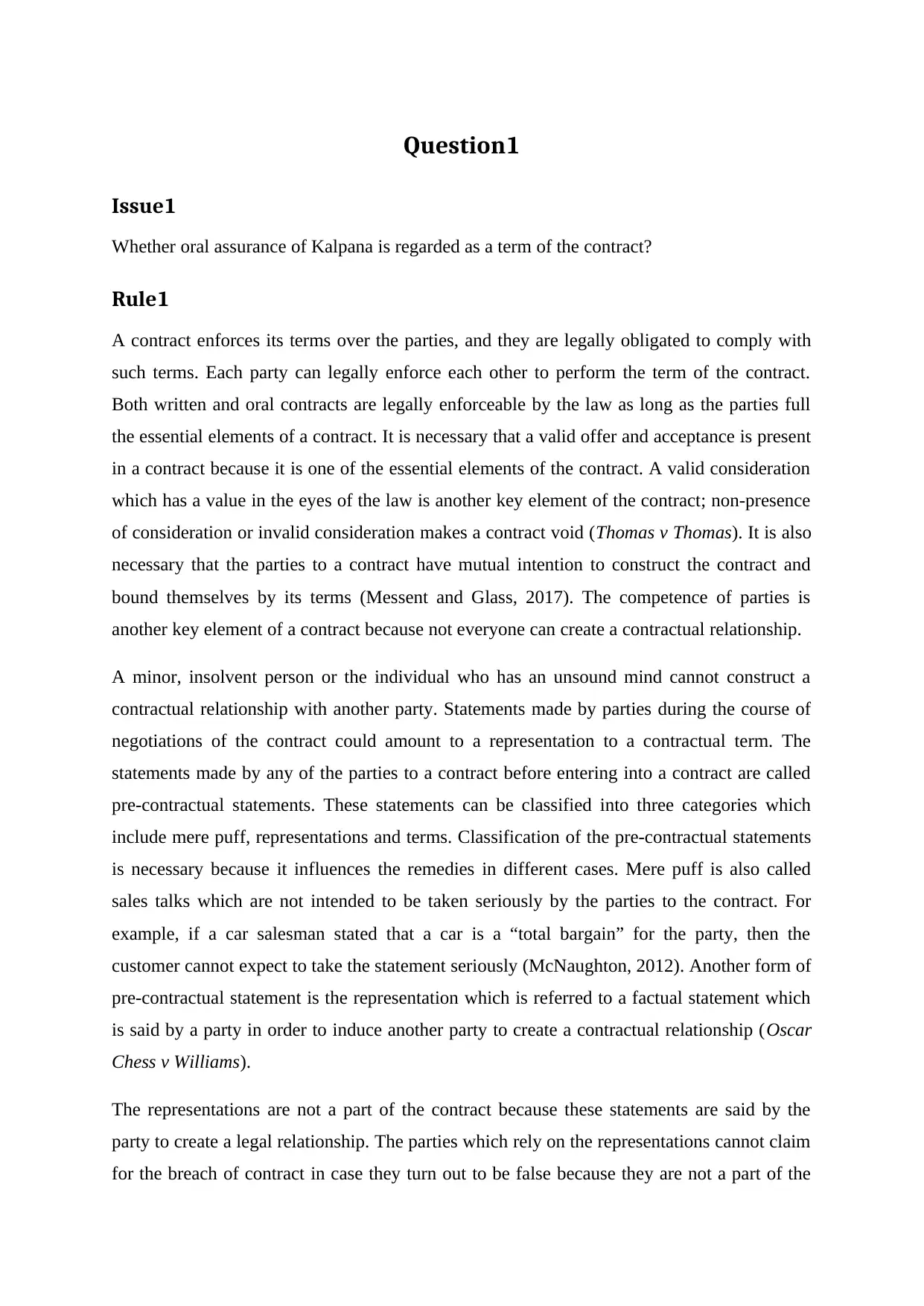
Question1
Issue1
Whether oral assurance of Kalpana is regarded as a term of the contract?
Rule1
A contract enforces its terms over the parties, and they are legally obligated to comply with
such terms. Each party can legally enforce each other to perform the term of the contract.
Both written and oral contracts are legally enforceable by the law as long as the parties full
the essential elements of a contract. It is necessary that a valid offer and acceptance is present
in a contract because it is one of the essential elements of the contract. A valid consideration
which has a value in the eyes of the law is another key element of the contract; non-presence
of consideration or invalid consideration makes a contract void (Thomas v Thomas). It is also
necessary that the parties to a contract have mutual intention to construct the contract and
bound themselves by its terms (Messent and Glass, 2017). The competence of parties is
another key element of a contract because not everyone can create a contractual relationship.
A minor, insolvent person or the individual who has an unsound mind cannot construct a
contractual relationship with another party. Statements made by parties during the course of
negotiations of the contract could amount to a representation to a contractual term. The
statements made by any of the parties to a contract before entering into a contract are called
pre-contractual statements. These statements can be classified into three categories which
include mere puff, representations and terms. Classification of the pre-contractual statements
is necessary because it influences the remedies in different cases. Mere puff is also called
sales talks which are not intended to be taken seriously by the parties to the contract. For
example, if a car salesman stated that a car is a “total bargain” for the party, then the
customer cannot expect to take the statement seriously (McNaughton, 2012). Another form of
pre-contractual statement is the representation which is referred to a factual statement which
is said by a party in order to induce another party to create a contractual relationship (Oscar
Chess v Williams).
The representations are not a part of the contract because these statements are said by the
party to create a legal relationship. The parties which rely on the representations cannot claim
for the breach of contract in case they turn out to be false because they are not a part of the
Issue1
Whether oral assurance of Kalpana is regarded as a term of the contract?
Rule1
A contract enforces its terms over the parties, and they are legally obligated to comply with
such terms. Each party can legally enforce each other to perform the term of the contract.
Both written and oral contracts are legally enforceable by the law as long as the parties full
the essential elements of a contract. It is necessary that a valid offer and acceptance is present
in a contract because it is one of the essential elements of the contract. A valid consideration
which has a value in the eyes of the law is another key element of the contract; non-presence
of consideration or invalid consideration makes a contract void (Thomas v Thomas). It is also
necessary that the parties to a contract have mutual intention to construct the contract and
bound themselves by its terms (Messent and Glass, 2017). The competence of parties is
another key element of a contract because not everyone can create a contractual relationship.
A minor, insolvent person or the individual who has an unsound mind cannot construct a
contractual relationship with another party. Statements made by parties during the course of
negotiations of the contract could amount to a representation to a contractual term. The
statements made by any of the parties to a contract before entering into a contract are called
pre-contractual statements. These statements can be classified into three categories which
include mere puff, representations and terms. Classification of the pre-contractual statements
is necessary because it influences the remedies in different cases. Mere puff is also called
sales talks which are not intended to be taken seriously by the parties to the contract. For
example, if a car salesman stated that a car is a “total bargain” for the party, then the
customer cannot expect to take the statement seriously (McNaughton, 2012). Another form of
pre-contractual statement is the representation which is referred to a factual statement which
is said by a party in order to induce another party to create a contractual relationship (Oscar
Chess v Williams).
The representations are not a part of the contract because these statements are said by the
party to create a legal relationship. The parties which rely on the representations cannot claim
for the breach of contract in case they turn out to be false because they are not a part of the
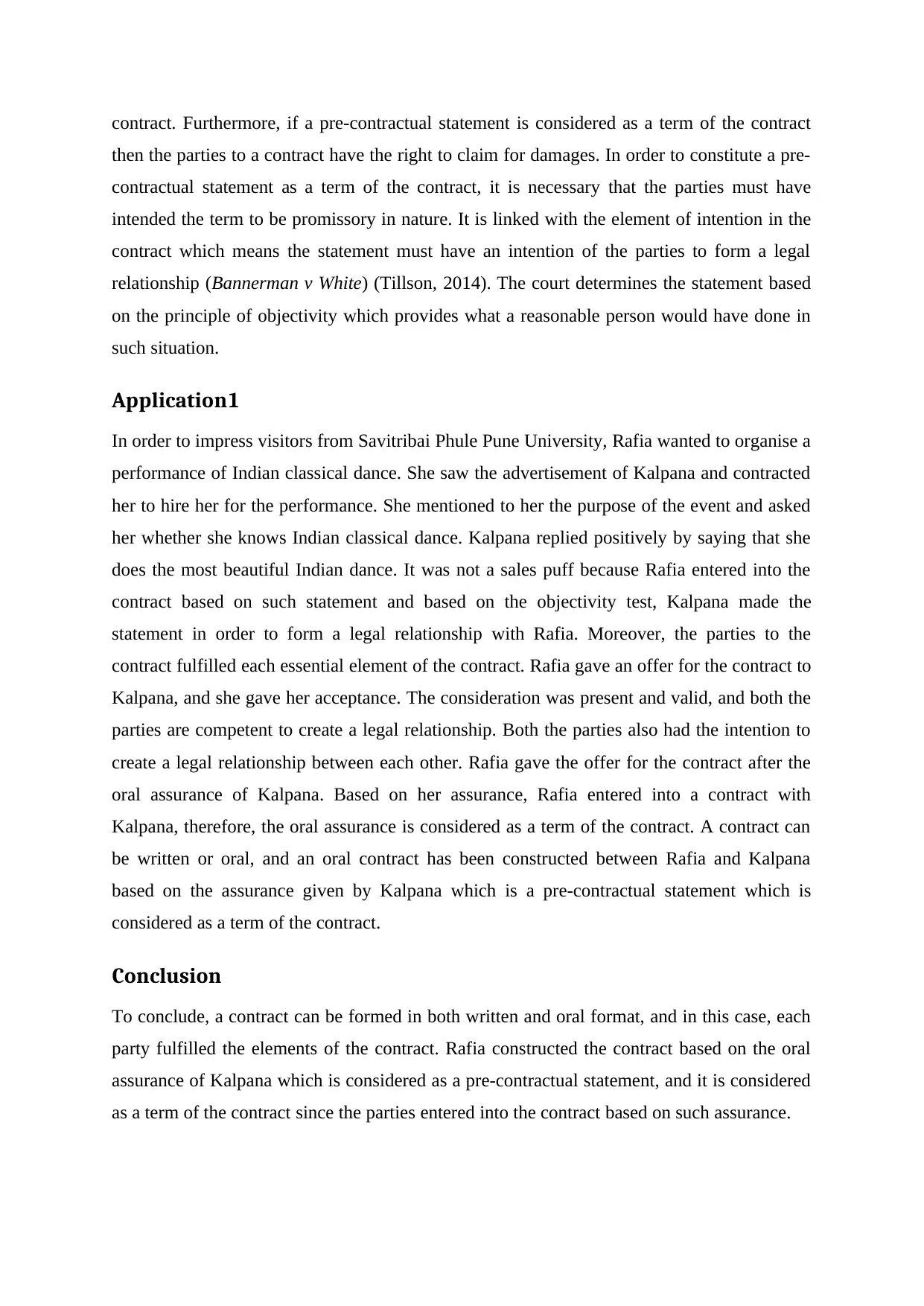
contract. Furthermore, if a pre-contractual statement is considered as a term of the contract
then the parties to a contract have the right to claim for damages. In order to constitute a pre-
contractual statement as a term of the contract, it is necessary that the parties must have
intended the term to be promissory in nature. It is linked with the element of intention in the
contract which means the statement must have an intention of the parties to form a legal
relationship (Bannerman v White) (Tillson, 2014). The court determines the statement based
on the principle of objectivity which provides what a reasonable person would have done in
such situation.
Application1
In order to impress visitors from Savitribai Phule Pune University, Rafia wanted to organise a
performance of Indian classical dance. She saw the advertisement of Kalpana and contracted
her to hire her for the performance. She mentioned to her the purpose of the event and asked
her whether she knows Indian classical dance. Kalpana replied positively by saying that she
does the most beautiful Indian dance. It was not a sales puff because Rafia entered into the
contract based on such statement and based on the objectivity test, Kalpana made the
statement in order to form a legal relationship with Rafia. Moreover, the parties to the
contract fulfilled each essential element of the contract. Rafia gave an offer for the contract to
Kalpana, and she gave her acceptance. The consideration was present and valid, and both the
parties are competent to create a legal relationship. Both the parties also had the intention to
create a legal relationship between each other. Rafia gave the offer for the contract after the
oral assurance of Kalpana. Based on her assurance, Rafia entered into a contract with
Kalpana, therefore, the oral assurance is considered as a term of the contract. A contract can
be written or oral, and an oral contract has been constructed between Rafia and Kalpana
based on the assurance given by Kalpana which is a pre-contractual statement which is
considered as a term of the contract.
Conclusion
To conclude, a contract can be formed in both written and oral format, and in this case, each
party fulfilled the elements of the contract. Rafia constructed the contract based on the oral
assurance of Kalpana which is considered as a pre-contractual statement, and it is considered
as a term of the contract since the parties entered into the contract based on such assurance.
then the parties to a contract have the right to claim for damages. In order to constitute a pre-
contractual statement as a term of the contract, it is necessary that the parties must have
intended the term to be promissory in nature. It is linked with the element of intention in the
contract which means the statement must have an intention of the parties to form a legal
relationship (Bannerman v White) (Tillson, 2014). The court determines the statement based
on the principle of objectivity which provides what a reasonable person would have done in
such situation.
Application1
In order to impress visitors from Savitribai Phule Pune University, Rafia wanted to organise a
performance of Indian classical dance. She saw the advertisement of Kalpana and contracted
her to hire her for the performance. She mentioned to her the purpose of the event and asked
her whether she knows Indian classical dance. Kalpana replied positively by saying that she
does the most beautiful Indian dance. It was not a sales puff because Rafia entered into the
contract based on such statement and based on the objectivity test, Kalpana made the
statement in order to form a legal relationship with Rafia. Moreover, the parties to the
contract fulfilled each essential element of the contract. Rafia gave an offer for the contract to
Kalpana, and she gave her acceptance. The consideration was present and valid, and both the
parties are competent to create a legal relationship. Both the parties also had the intention to
create a legal relationship between each other. Rafia gave the offer for the contract after the
oral assurance of Kalpana. Based on her assurance, Rafia entered into a contract with
Kalpana, therefore, the oral assurance is considered as a term of the contract. A contract can
be written or oral, and an oral contract has been constructed between Rafia and Kalpana
based on the assurance given by Kalpana which is a pre-contractual statement which is
considered as a term of the contract.
Conclusion
To conclude, a contract can be formed in both written and oral format, and in this case, each
party fulfilled the elements of the contract. Rafia constructed the contract based on the oral
assurance of Kalpana which is considered as a pre-contractual statement, and it is considered
as a term of the contract since the parties entered into the contract based on such assurance.
⊘ This is a preview!⊘
Do you want full access?
Subscribe today to unlock all pages.

Trusted by 1+ million students worldwide
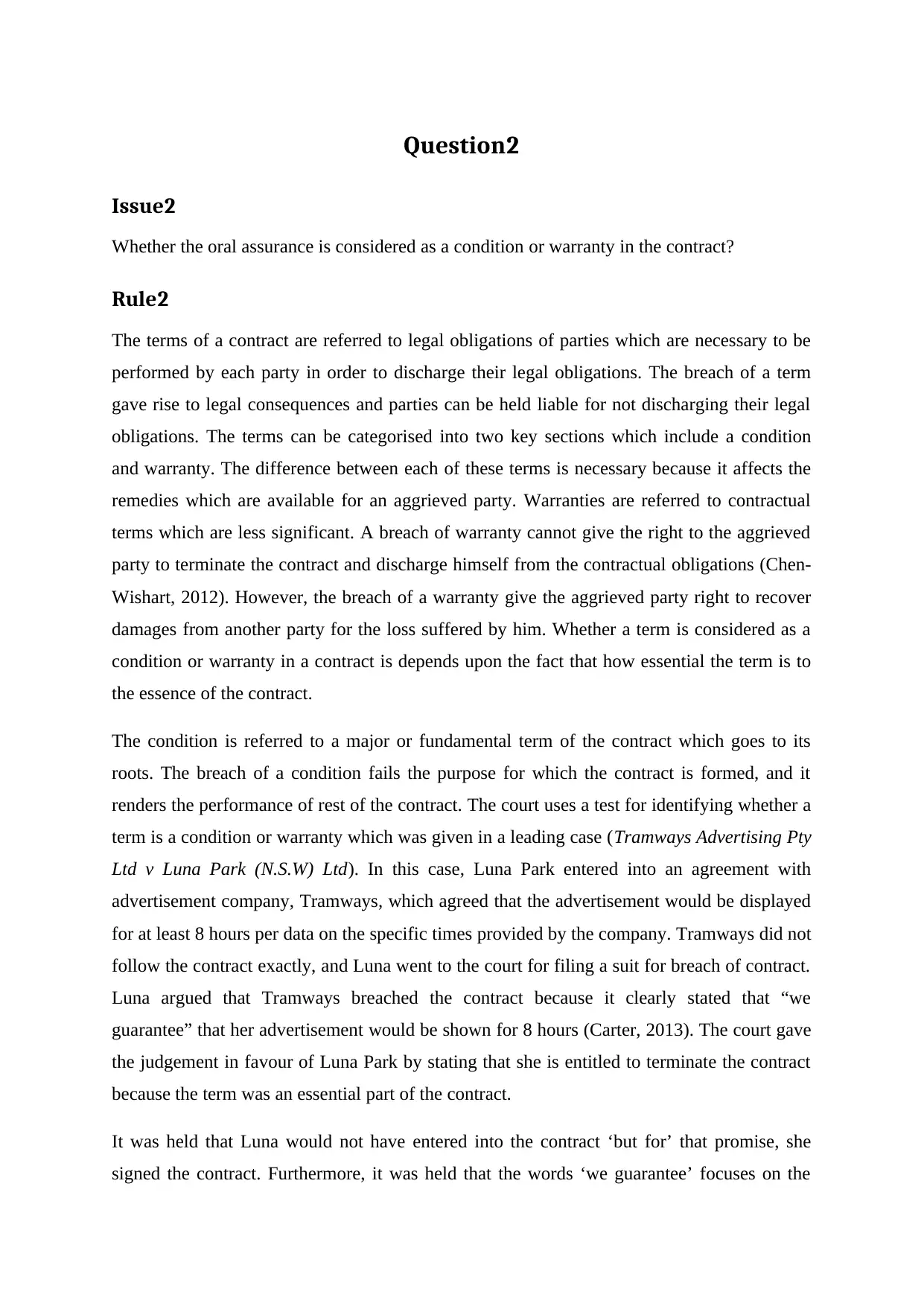
Question2
Issue2
Whether the oral assurance is considered as a condition or warranty in the contract?
Rule2
The terms of a contract are referred to legal obligations of parties which are necessary to be
performed by each party in order to discharge their legal obligations. The breach of a term
gave rise to legal consequences and parties can be held liable for not discharging their legal
obligations. The terms can be categorised into two key sections which include a condition
and warranty. The difference between each of these terms is necessary because it affects the
remedies which are available for an aggrieved party. Warranties are referred to contractual
terms which are less significant. A breach of warranty cannot give the right to the aggrieved
party to terminate the contract and discharge himself from the contractual obligations (Chen-
Wishart, 2012). However, the breach of a warranty give the aggrieved party right to recover
damages from another party for the loss suffered by him. Whether a term is considered as a
condition or warranty in a contract is depends upon the fact that how essential the term is to
the essence of the contract.
The condition is referred to a major or fundamental term of the contract which goes to its
roots. The breach of a condition fails the purpose for which the contract is formed, and it
renders the performance of rest of the contract. The court uses a test for identifying whether a
term is a condition or warranty which was given in a leading case (Tramways Advertising Pty
Ltd v Luna Park (N.S.W) Ltd). In this case, Luna Park entered into an agreement with
advertisement company, Tramways, which agreed that the advertisement would be displayed
for at least 8 hours per data on the specific times provided by the company. Tramways did not
follow the contract exactly, and Luna went to the court for filing a suit for breach of contract.
Luna argued that Tramways breached the contract because it clearly stated that “we
guarantee” that her advertisement would be shown for 8 hours (Carter, 2013). The court gave
the judgement in favour of Luna Park by stating that she is entitled to terminate the contract
because the term was an essential part of the contract.
It was held that Luna would not have entered into the contract ‘but for’ that promise, she
signed the contract. Furthermore, it was held that the words ‘we guarantee’ focuses on the
Issue2
Whether the oral assurance is considered as a condition or warranty in the contract?
Rule2
The terms of a contract are referred to legal obligations of parties which are necessary to be
performed by each party in order to discharge their legal obligations. The breach of a term
gave rise to legal consequences and parties can be held liable for not discharging their legal
obligations. The terms can be categorised into two key sections which include a condition
and warranty. The difference between each of these terms is necessary because it affects the
remedies which are available for an aggrieved party. Warranties are referred to contractual
terms which are less significant. A breach of warranty cannot give the right to the aggrieved
party to terminate the contract and discharge himself from the contractual obligations (Chen-
Wishart, 2012). However, the breach of a warranty give the aggrieved party right to recover
damages from another party for the loss suffered by him. Whether a term is considered as a
condition or warranty in a contract is depends upon the fact that how essential the term is to
the essence of the contract.
The condition is referred to a major or fundamental term of the contract which goes to its
roots. The breach of a condition fails the purpose for which the contract is formed, and it
renders the performance of rest of the contract. The court uses a test for identifying whether a
term is a condition or warranty which was given in a leading case (Tramways Advertising Pty
Ltd v Luna Park (N.S.W) Ltd). In this case, Luna Park entered into an agreement with
advertisement company, Tramways, which agreed that the advertisement would be displayed
for at least 8 hours per data on the specific times provided by the company. Tramways did not
follow the contract exactly, and Luna went to the court for filing a suit for breach of contract.
Luna argued that Tramways breached the contract because it clearly stated that “we
guarantee” that her advertisement would be shown for 8 hours (Carter, 2013). The court gave
the judgement in favour of Luna Park by stating that she is entitled to terminate the contract
because the term was an essential part of the contract.
It was held that Luna would not have entered into the contract ‘but for’ that promise, she
signed the contract. Furthermore, it was held that the words ‘we guarantee’ focuses on the
Paraphrase This Document
Need a fresh take? Get an instant paraphrase of this document with our AI Paraphraser
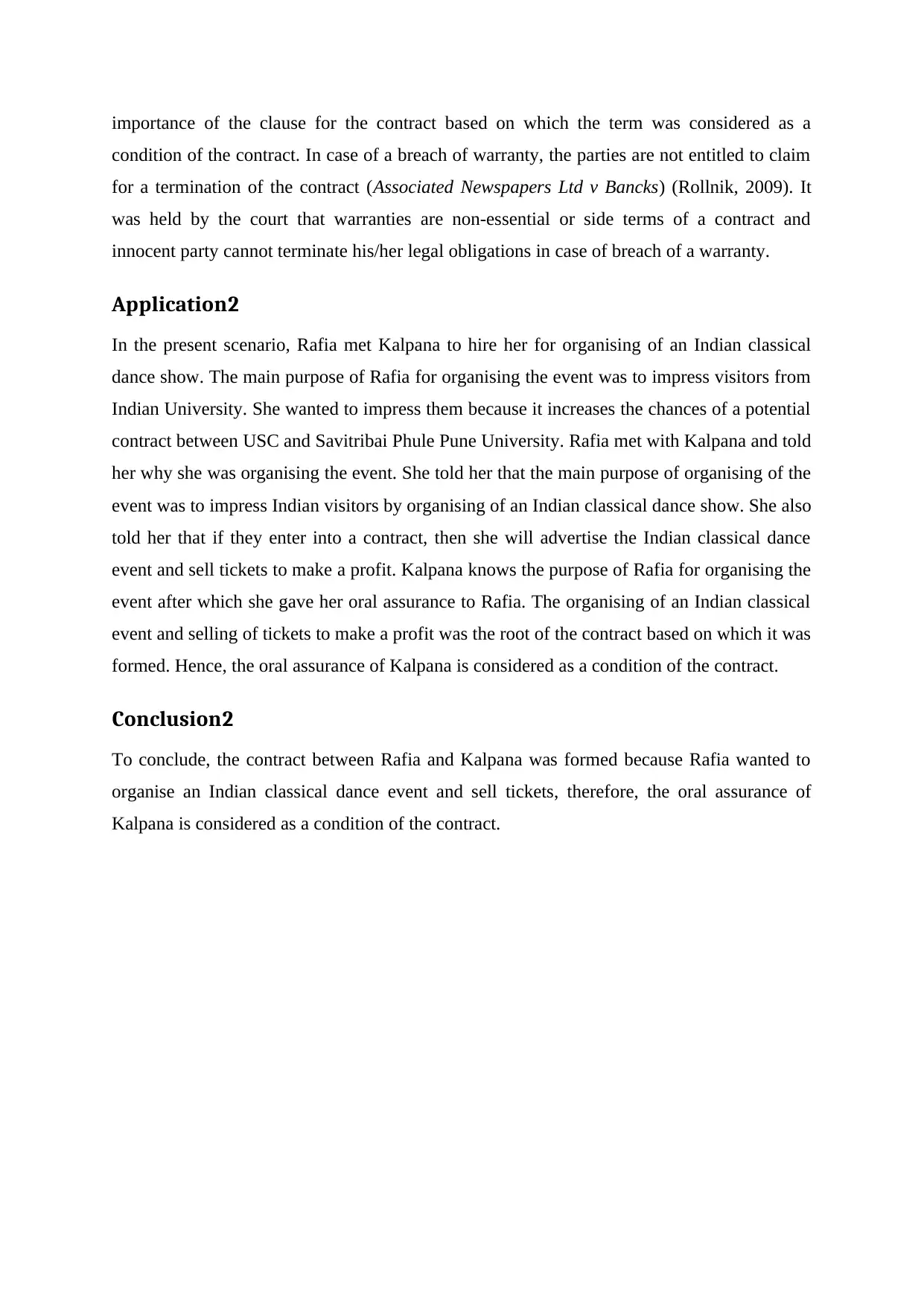
importance of the clause for the contract based on which the term was considered as a
condition of the contract. In case of a breach of warranty, the parties are not entitled to claim
for a termination of the contract (Associated Newspapers Ltd v Bancks) (Rollnik, 2009). It
was held by the court that warranties are non-essential or side terms of a contract and
innocent party cannot terminate his/her legal obligations in case of breach of a warranty.
Application2
In the present scenario, Rafia met Kalpana to hire her for organising of an Indian classical
dance show. The main purpose of Rafia for organising the event was to impress visitors from
Indian University. She wanted to impress them because it increases the chances of a potential
contract between USC and Savitribai Phule Pune University. Rafia met with Kalpana and told
her why she was organising the event. She told her that the main purpose of organising of the
event was to impress Indian visitors by organising of an Indian classical dance show. She also
told her that if they enter into a contract, then she will advertise the Indian classical dance
event and sell tickets to make a profit. Kalpana knows the purpose of Rafia for organising the
event after which she gave her oral assurance to Rafia. The organising of an Indian classical
event and selling of tickets to make a profit was the root of the contract based on which it was
formed. Hence, the oral assurance of Kalpana is considered as a condition of the contract.
Conclusion2
To conclude, the contract between Rafia and Kalpana was formed because Rafia wanted to
organise an Indian classical dance event and sell tickets, therefore, the oral assurance of
Kalpana is considered as a condition of the contract.
condition of the contract. In case of a breach of warranty, the parties are not entitled to claim
for a termination of the contract (Associated Newspapers Ltd v Bancks) (Rollnik, 2009). It
was held by the court that warranties are non-essential or side terms of a contract and
innocent party cannot terminate his/her legal obligations in case of breach of a warranty.
Application2
In the present scenario, Rafia met Kalpana to hire her for organising of an Indian classical
dance show. The main purpose of Rafia for organising the event was to impress visitors from
Indian University. She wanted to impress them because it increases the chances of a potential
contract between USC and Savitribai Phule Pune University. Rafia met with Kalpana and told
her why she was organising the event. She told her that the main purpose of organising of the
event was to impress Indian visitors by organising of an Indian classical dance show. She also
told her that if they enter into a contract, then she will advertise the Indian classical dance
event and sell tickets to make a profit. Kalpana knows the purpose of Rafia for organising the
event after which she gave her oral assurance to Rafia. The organising of an Indian classical
event and selling of tickets to make a profit was the root of the contract based on which it was
formed. Hence, the oral assurance of Kalpana is considered as a condition of the contract.
Conclusion2
To conclude, the contract between Rafia and Kalpana was formed because Rafia wanted to
organise an Indian classical dance event and sell tickets, therefore, the oral assurance of
Kalpana is considered as a condition of the contract.
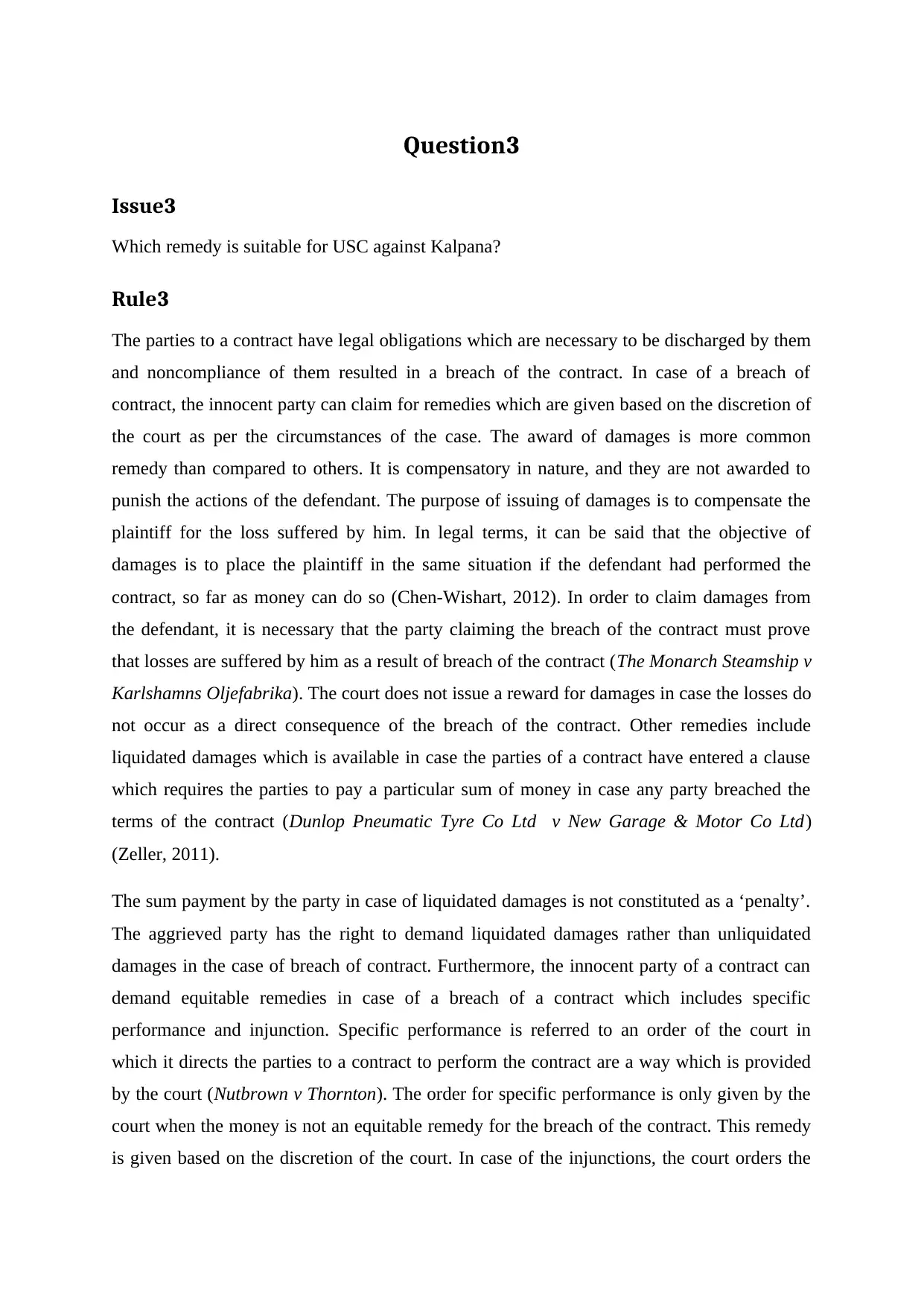
Question3
Issue3
Which remedy is suitable for USC against Kalpana?
Rule3
The parties to a contract have legal obligations which are necessary to be discharged by them
and noncompliance of them resulted in a breach of the contract. In case of a breach of
contract, the innocent party can claim for remedies which are given based on the discretion of
the court as per the circumstances of the case. The award of damages is more common
remedy than compared to others. It is compensatory in nature, and they are not awarded to
punish the actions of the defendant. The purpose of issuing of damages is to compensate the
plaintiff for the loss suffered by him. In legal terms, it can be said that the objective of
damages is to place the plaintiff in the same situation if the defendant had performed the
contract, so far as money can do so (Chen-Wishart, 2012). In order to claim damages from
the defendant, it is necessary that the party claiming the breach of the contract must prove
that losses are suffered by him as a result of breach of the contract (The Monarch Steamship v
Karlshamns Oljefabrika). The court does not issue a reward for damages in case the losses do
not occur as a direct consequence of the breach of the contract. Other remedies include
liquidated damages which is available in case the parties of a contract have entered a clause
which requires the parties to pay a particular sum of money in case any party breached the
terms of the contract (Dunlop Pneumatic Tyre Co Ltd v New Garage & Motor Co Ltd)
(Zeller, 2011).
The sum payment by the party in case of liquidated damages is not constituted as a ‘penalty’.
The aggrieved party has the right to demand liquidated damages rather than unliquidated
damages in the case of breach of contract. Furthermore, the innocent party of a contract can
demand equitable remedies in case of a breach of a contract which includes specific
performance and injunction. Specific performance is referred to an order of the court in
which it directs the parties to a contract to perform the contract are a way which is provided
by the court (Nutbrown v Thornton). The order for specific performance is only given by the
court when the money is not an equitable remedy for the breach of the contract. This remedy
is given based on the discretion of the court. In case of the injunctions, the court orders the
Issue3
Which remedy is suitable for USC against Kalpana?
Rule3
The parties to a contract have legal obligations which are necessary to be discharged by them
and noncompliance of them resulted in a breach of the contract. In case of a breach of
contract, the innocent party can claim for remedies which are given based on the discretion of
the court as per the circumstances of the case. The award of damages is more common
remedy than compared to others. It is compensatory in nature, and they are not awarded to
punish the actions of the defendant. The purpose of issuing of damages is to compensate the
plaintiff for the loss suffered by him. In legal terms, it can be said that the objective of
damages is to place the plaintiff in the same situation if the defendant had performed the
contract, so far as money can do so (Chen-Wishart, 2012). In order to claim damages from
the defendant, it is necessary that the party claiming the breach of the contract must prove
that losses are suffered by him as a result of breach of the contract (The Monarch Steamship v
Karlshamns Oljefabrika). The court does not issue a reward for damages in case the losses do
not occur as a direct consequence of the breach of the contract. Other remedies include
liquidated damages which is available in case the parties of a contract have entered a clause
which requires the parties to pay a particular sum of money in case any party breached the
terms of the contract (Dunlop Pneumatic Tyre Co Ltd v New Garage & Motor Co Ltd)
(Zeller, 2011).
The sum payment by the party in case of liquidated damages is not constituted as a ‘penalty’.
The aggrieved party has the right to demand liquidated damages rather than unliquidated
damages in the case of breach of contract. Furthermore, the innocent party of a contract can
demand equitable remedies in case of a breach of a contract which includes specific
performance and injunction. Specific performance is referred to an order of the court in
which it directs the parties to a contract to perform the contract are a way which is provided
by the court (Nutbrown v Thornton). The order for specific performance is only given by the
court when the money is not an equitable remedy for the breach of the contract. This remedy
is given based on the discretion of the court. In case of the injunctions, the court orders the
⊘ This is a preview!⊘
Do you want full access?
Subscribe today to unlock all pages.

Trusted by 1+ million students worldwide
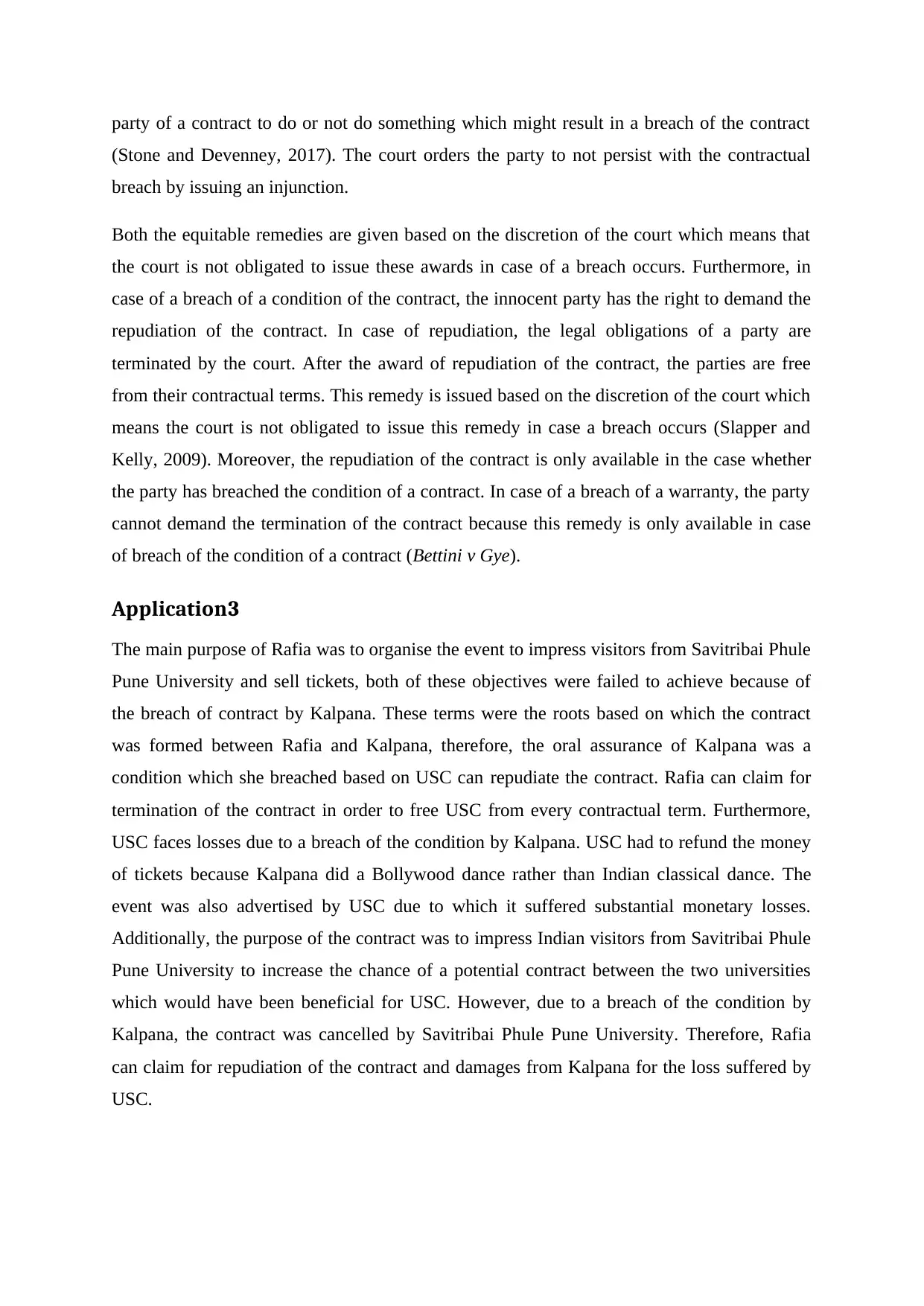
party of a contract to do or not do something which might result in a breach of the contract
(Stone and Devenney, 2017). The court orders the party to not persist with the contractual
breach by issuing an injunction.
Both the equitable remedies are given based on the discretion of the court which means that
the court is not obligated to issue these awards in case of a breach occurs. Furthermore, in
case of a breach of a condition of the contract, the innocent party has the right to demand the
repudiation of the contract. In case of repudiation, the legal obligations of a party are
terminated by the court. After the award of repudiation of the contract, the parties are free
from their contractual terms. This remedy is issued based on the discretion of the court which
means the court is not obligated to issue this remedy in case a breach occurs (Slapper and
Kelly, 2009). Moreover, the repudiation of the contract is only available in the case whether
the party has breached the condition of a contract. In case of a breach of a warranty, the party
cannot demand the termination of the contract because this remedy is only available in case
of breach of the condition of a contract (Bettini v Gye).
Application3
The main purpose of Rafia was to organise the event to impress visitors from Savitribai Phule
Pune University and sell tickets, both of these objectives were failed to achieve because of
the breach of contract by Kalpana. These terms were the roots based on which the contract
was formed between Rafia and Kalpana, therefore, the oral assurance of Kalpana was a
condition which she breached based on USC can repudiate the contract. Rafia can claim for
termination of the contract in order to free USC from every contractual term. Furthermore,
USC faces losses due to a breach of the condition by Kalpana. USC had to refund the money
of tickets because Kalpana did a Bollywood dance rather than Indian classical dance. The
event was also advertised by USC due to which it suffered substantial monetary losses.
Additionally, the purpose of the contract was to impress Indian visitors from Savitribai Phule
Pune University to increase the chance of a potential contract between the two universities
which would have been beneficial for USC. However, due to a breach of the condition by
Kalpana, the contract was cancelled by Savitribai Phule Pune University. Therefore, Rafia
can claim for repudiation of the contract and damages from Kalpana for the loss suffered by
USC.
(Stone and Devenney, 2017). The court orders the party to not persist with the contractual
breach by issuing an injunction.
Both the equitable remedies are given based on the discretion of the court which means that
the court is not obligated to issue these awards in case of a breach occurs. Furthermore, in
case of a breach of a condition of the contract, the innocent party has the right to demand the
repudiation of the contract. In case of repudiation, the legal obligations of a party are
terminated by the court. After the award of repudiation of the contract, the parties are free
from their contractual terms. This remedy is issued based on the discretion of the court which
means the court is not obligated to issue this remedy in case a breach occurs (Slapper and
Kelly, 2009). Moreover, the repudiation of the contract is only available in the case whether
the party has breached the condition of a contract. In case of a breach of a warranty, the party
cannot demand the termination of the contract because this remedy is only available in case
of breach of the condition of a contract (Bettini v Gye).
Application3
The main purpose of Rafia was to organise the event to impress visitors from Savitribai Phule
Pune University and sell tickets, both of these objectives were failed to achieve because of
the breach of contract by Kalpana. These terms were the roots based on which the contract
was formed between Rafia and Kalpana, therefore, the oral assurance of Kalpana was a
condition which she breached based on USC can repudiate the contract. Rafia can claim for
termination of the contract in order to free USC from every contractual term. Furthermore,
USC faces losses due to a breach of the condition by Kalpana. USC had to refund the money
of tickets because Kalpana did a Bollywood dance rather than Indian classical dance. The
event was also advertised by USC due to which it suffered substantial monetary losses.
Additionally, the purpose of the contract was to impress Indian visitors from Savitribai Phule
Pune University to increase the chance of a potential contract between the two universities
which would have been beneficial for USC. However, due to a breach of the condition by
Kalpana, the contract was cancelled by Savitribai Phule Pune University. Therefore, Rafia
can claim for repudiation of the contract and damages from Kalpana for the loss suffered by
USC.
Paraphrase This Document
Need a fresh take? Get an instant paraphrase of this document with our AI Paraphraser

Conclusion3
To conclude, repudiation and damages are suitable remedies for USC in this scenario.
To conclude, repudiation and damages are suitable remedies for USC in this scenario.
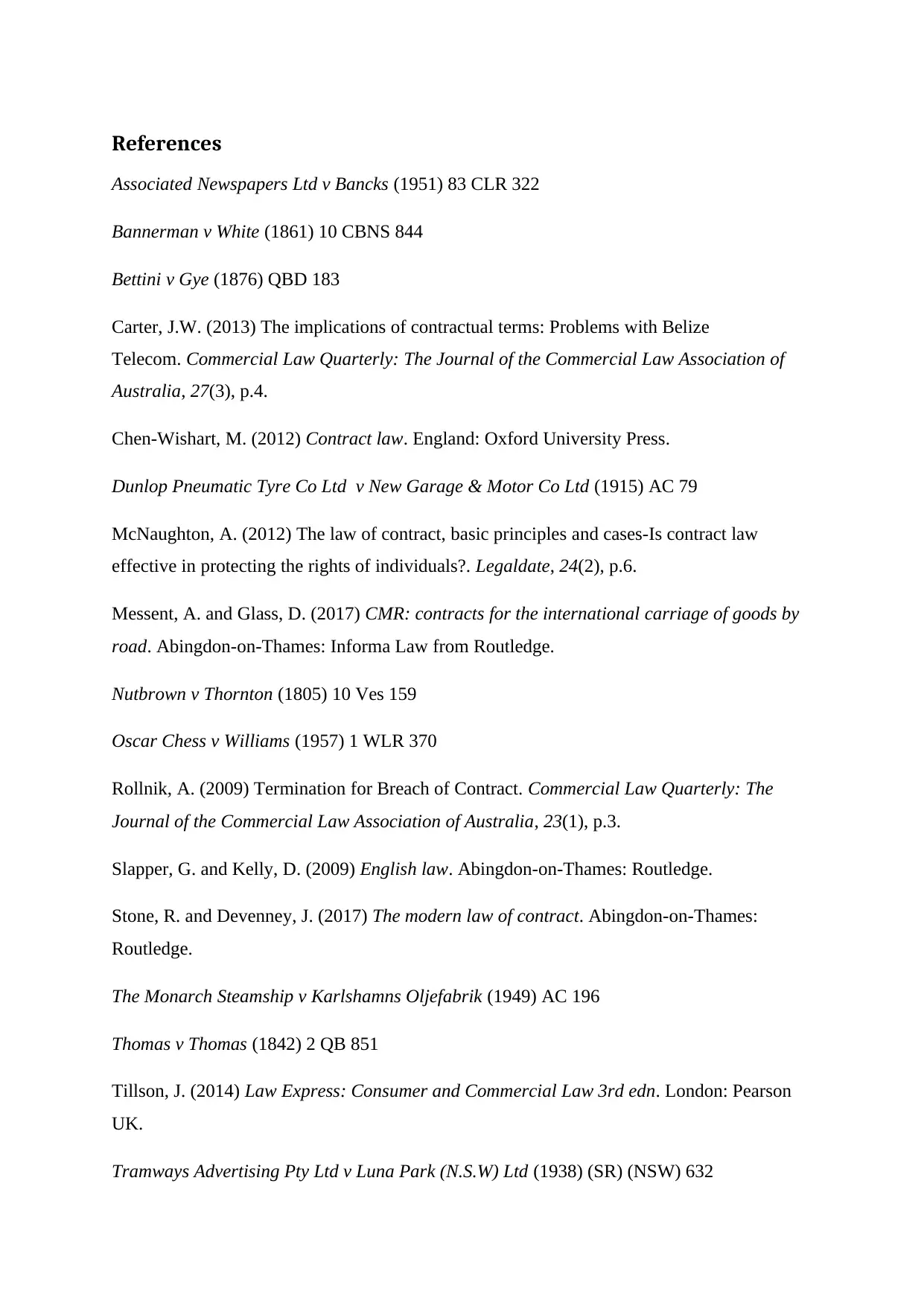
References
Associated Newspapers Ltd v Bancks (1951) 83 CLR 322
Bannerman v White (1861) 10 CBNS 844
Bettini v Gye (1876) QBD 183
Carter, J.W. (2013) The implications of contractual terms: Problems with Belize
Telecom. Commercial Law Quarterly: The Journal of the Commercial Law Association of
Australia, 27(3), p.4.
Chen-Wishart, M. (2012) Contract law. England: Oxford University Press.
Dunlop Pneumatic Tyre Co Ltd v New Garage & Motor Co Ltd (1915) AC 79
McNaughton, A. (2012) The law of contract, basic principles and cases-Is contract law
effective in protecting the rights of individuals?. Legaldate, 24(2), p.6.
Messent, A. and Glass, D. (2017) CMR: contracts for the international carriage of goods by
road. Abingdon-on-Thames: Informa Law from Routledge.
Nutbrown v Thornton (1805) 10 Ves 159
Oscar Chess v Williams (1957) 1 WLR 370
Rollnik, A. (2009) Termination for Breach of Contract. Commercial Law Quarterly: The
Journal of the Commercial Law Association of Australia, 23(1), p.3.
Slapper, G. and Kelly, D. (2009) English law. Abingdon-on-Thames: Routledge.
Stone, R. and Devenney, J. (2017) The modern law of contract. Abingdon-on-Thames:
Routledge.
The Monarch Steamship v Karlshamns Oljefabrik (1949) AC 196
Thomas v Thomas (1842) 2 QB 851
Tillson, J. (2014) Law Express: Consumer and Commercial Law 3rd edn. London: Pearson
UK.
Tramways Advertising Pty Ltd v Luna Park (N.S.W) Ltd (1938) (SR) (NSW) 632
Associated Newspapers Ltd v Bancks (1951) 83 CLR 322
Bannerman v White (1861) 10 CBNS 844
Bettini v Gye (1876) QBD 183
Carter, J.W. (2013) The implications of contractual terms: Problems with Belize
Telecom. Commercial Law Quarterly: The Journal of the Commercial Law Association of
Australia, 27(3), p.4.
Chen-Wishart, M. (2012) Contract law. England: Oxford University Press.
Dunlop Pneumatic Tyre Co Ltd v New Garage & Motor Co Ltd (1915) AC 79
McNaughton, A. (2012) The law of contract, basic principles and cases-Is contract law
effective in protecting the rights of individuals?. Legaldate, 24(2), p.6.
Messent, A. and Glass, D. (2017) CMR: contracts for the international carriage of goods by
road. Abingdon-on-Thames: Informa Law from Routledge.
Nutbrown v Thornton (1805) 10 Ves 159
Oscar Chess v Williams (1957) 1 WLR 370
Rollnik, A. (2009) Termination for Breach of Contract. Commercial Law Quarterly: The
Journal of the Commercial Law Association of Australia, 23(1), p.3.
Slapper, G. and Kelly, D. (2009) English law. Abingdon-on-Thames: Routledge.
Stone, R. and Devenney, J. (2017) The modern law of contract. Abingdon-on-Thames:
Routledge.
The Monarch Steamship v Karlshamns Oljefabrik (1949) AC 196
Thomas v Thomas (1842) 2 QB 851
Tillson, J. (2014) Law Express: Consumer and Commercial Law 3rd edn. London: Pearson
UK.
Tramways Advertising Pty Ltd v Luna Park (N.S.W) Ltd (1938) (SR) (NSW) 632
⊘ This is a preview!⊘
Do you want full access?
Subscribe today to unlock all pages.

Trusted by 1+ million students worldwide

Zeller, B. (2011) Penalty Clauses: Are They Governed by the CISG. Pace Int'l L. Rev., 23,
p.1.
p.1.
1 out of 10
Related Documents
Your All-in-One AI-Powered Toolkit for Academic Success.
+13062052269
info@desklib.com
Available 24*7 on WhatsApp / Email
![[object Object]](/_next/static/media/star-bottom.7253800d.svg)
Unlock your academic potential
Copyright © 2020–2025 A2Z Services. All Rights Reserved. Developed and managed by ZUCOL.





